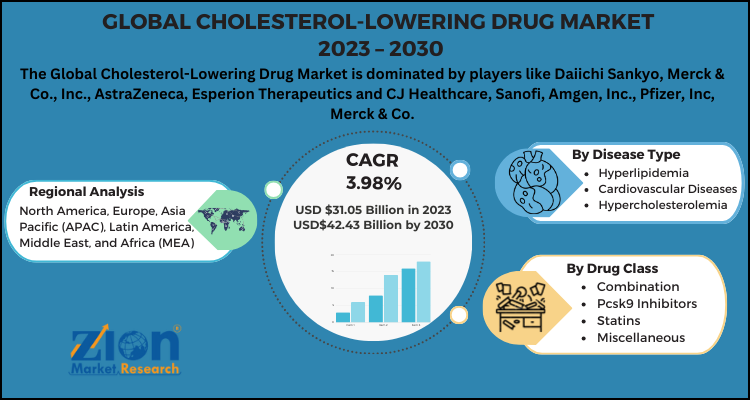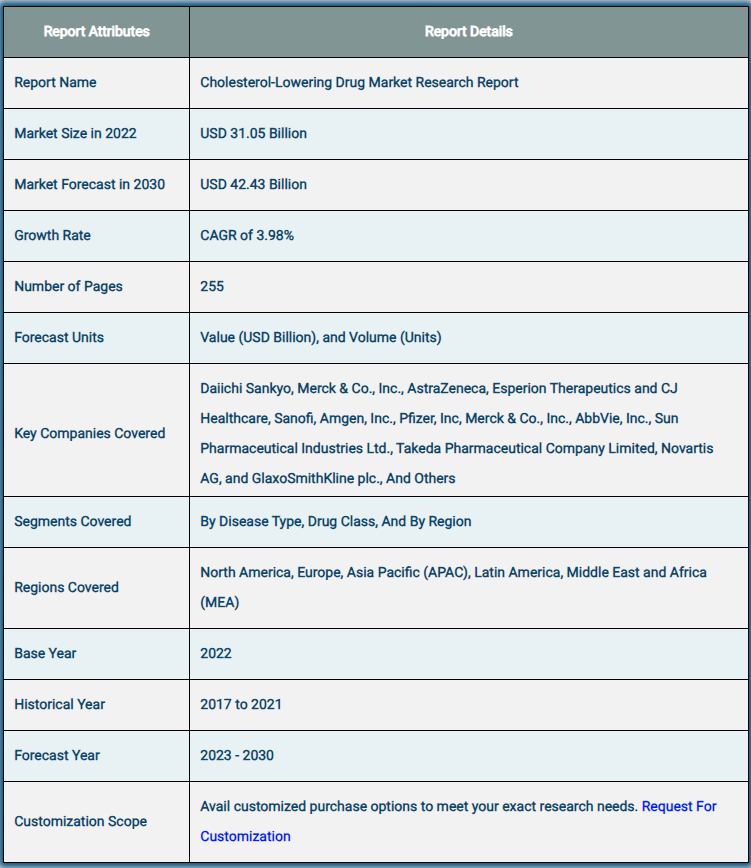Cholesterol-Lowering Drug Market Size, Share, Industry Analysis, Trends, Growth, Forecasts, 2030

✈👉Get a Free Sample: 🚀https://www.zionmarketresearch.com/sample/cholesterol-lowering-drug-market
Introduction
Cholesterol-lowering drugs, also known as lipid-lowering agents, play a crucial role in the management of hyperlipidemia and the prevention of cardiovascular diseases (CVD). These medications are essential in lowering low-density lipoprotein (LDL) cholesterol levels, thereby reducing the risk of heart attacks, strokes, and other cardiovascular complications. This research article provides an in-depth analysis of the current trends, drivers, challenges, and future outlook of the cholesterol-lowering drug market.
Overview of the Global Market for Cholesterol-Lowering Drugs
The global cholesterol-lowering drug market was valued at approximately USD 23 billion in 2023 and is projected to grow at a compound annual growth rate (CAGR) of 5.2% from 2024 to 2030. The increasing prevalence of cholesterol-related health issues and a growing focus on preventive healthcare drive market growth.

The study examines the factors that are driving, posing constraints or difficulties, and impacting demand for cholesterol-lowering drugs globally during the course of the forecast period. The paper also looks at new prospects in the cholesterol-lowering medication sector.
The category of steroids includes cholesterol. These are lipids in the organic category. Animal cells’ membrane and structural element, cholesterol, is essential. Still, every animal cell biosynthesizes it. The biological synthesis of steroid hormones such as estrogen and testosterone, vitamin D, and bile acid depends on cholesterol. Poultry, meat, eggs, and dairy products are the main sources of cholesterol production. Furthermore, a high cholesterol level may be a side consequence of obesity, an improper diet, a genetic condition, or another illness.
Growth Factors for the Global Cholesterol-Lowering Drug Market
The primary driver of the global market for cholesterol-lowering medications is rising public awareness of harmful cholesterol. Due to this expansion, the producers have been forced to conduct extensive exploratory research to identify patient-specific medications that are well-tolerated, hence improving outcomes. Furthermore, the industry’s considerable R&D efforts together with the use of bempedoic acid in the creation of novel medications are driving the expansion of the global market for cholesterol-lowering medications.
The market’s expansion is being aided by the introduction of new medicine classes for the benefit of non-statin users. On the other hand, a rise in the number of people taking statins and various recommendations for the use of antihyperlipidemics are driving the market’s expansion.
The risks of myocardial infarction and stroke are increased by high cholesterol. Additionally, hypercholesterolemia makes a person more susceptible to CVD. Certain comorbidities, such as type 2 diabetes and chronic renal disease, are also linked to hyperlipidemia. These elements support market expansion even further. The market is anticipated to grow as a result of the introduction of treatments such bempedoic acid, PCSK9 inhibitors, and several other medications.

Personalized medicine is being used by manufacturers to improve cardiovascular risk assessments and achieve better patient outcomes. On the other hand, the rising trend has brought the idea of precision medicine to the market, lowering cholesterol levels. By highlighting the encouraging outcomes of PCSK9 inhibitors for the treatment of coronary artery disorders, manufacturers are raising consumer awareness.
Leading companies in the world market for cholesterol-lowering medications are expanding their production capabilities in order to manufacture Evolocumab, a medication used to treat individuals at high risk. Additionally, they are attempting to produce Canakinumab, an antibody that aids in the reduction of cardiovascular events. Manufacturers are focusing on statins for secondary prevention, which assist in lowering patients’ LDL-C levels. Better results from the manufacturers’ efforts should accelerate the market’s global expansion.
✈👉Directly Purchase a copy of the report with TOC: 🚀https://www.zionmarketresearch.com/toc/cholesterol-lowering-drug-market
Global Market for Drugs That Lower Cholesterol: Report Scope

Global Drug Market for Lowering Cholesterol: Segmentation
Disease type, medicine class, and geography can be used to segment the worldwide market for cholesterol-lowering medications.
The market can be divided into hyperlipidemia, cardiovascular diseases, and hypercholesterolemia based on the kind of disease.
The market can be divided into four segments based on the drug class: combination, PCSK9 inhibitors, bile acid sequestrants, cholesterol absorption inhibitors, and statins, miscellaneous. Bempedoic acid, mipomersen, lomitapide, nicotinic acids, and omega-3 fatty acids are among the various medications.
Because of the development of successful treatments like bempedoic acid and PCSK9 inhibitors, the statins section of the worldwide cholesterol-lowering medication market has the biggest share.
Because of the increased end-user adoption of these medications and their increased safety, the miscellaneous category is also anticipated to expand rapidly over the course of the projection period.
Regional Analysis of the Global Market for Cholesterol-Lowering Drugs
Because cases of hypercholesterolemia are becoming more common in the region, Europe currently owns the highest share of the global market for cholesterol-lowering drugs. North America is one of the possible markets for cholesterol-lowering medications worldwide because of the industry’s ongoing technological advancements.
Over the course of the projected period, Asia Pacific is a potential region with significant growth opportunities in the global market.
Key Drivers
- Rising Prevalence of Cardiovascular Diseases: The increasing incidence of CVD due to lifestyle changes, unhealthy diets, and sedentary behavior significantly drives the demand for cholesterol-lowering medications.
- Growing Aging Population: As the global population ages, the prevalence of hyperlipidemia and related health conditions is expected to rise, leading to higher demand for cholesterol-lowering drugs.
- Increased Awareness and Screening: Rising awareness of the importance of managing cholesterol levels and regular health screenings contribute to the growing demand for cholesterol-lowering medications.
- Advancements in Drug Development: The introduction of novel classes of cholesterol-lowering drugs, such as PCSK9 inhibitors and cholesterol absorption inhibitors, offers new treatment options and drives market expansion.
- Health Insurance Coverage: Increased health insurance coverage and reimbursement policies for cholesterol-lowering drugs enhance accessibility and affordability for patients, boosting market growth.
Challenges
- Adverse Effects and Compliance Issues: Common side effects associated with cholesterol-lowering medications, such as muscle pain and gastrointestinal issues, may affect patient compliance and limit market growth.
- Market Competition: The cholesterol-lowering drug market is highly competitive, with numerous generics and brand-name medications available. This intense competition can impact pricing and profitability.
- Regulatory Hurdles: The stringent regulatory landscape for drug approval and market entry can pose challenges for manufacturers, particularly for new drugs entering the market.
- Shift Towards Lifestyle Interventions: An increasing focus on lifestyle modifications, such as diet and exercise, as first-line interventions for managing cholesterol levels may reduce reliance on pharmacotherapy.
Market Segmentation
The cholesterol-lowering drug market can be segmented based on drug class, application, and region:
- By Drug Class:
- Statins
- PCSK9 Inhibitors
- Cholesterol Absorption Inhibitors
- Fibrates
- Other Lipid-Lowering Agents
- By Application:
- Hyperlipidemia
- Cardiovascular Disease Prevention
- Other Metabolic Disorders
- By Region:
- North America
- Europe
- Asia-Pacific
- Latin America
- Middle East & Africa
Regional Insights
- North America: The North American market dominates the cholesterol-lowering drug market, primarily due to the high prevalence of cardiovascular diseases, advanced healthcare infrastructure, and significant investments in research and development.
- Europe: Europe holds a substantial share of the market, supported by increasing awareness of heart health and the presence of major pharmaceutical companies. Countries like Germany, the U.K., and France are key contributors.
- Asia-Pacific: The Asia-Pacific region is expected to witness rapid growth due to the rising incidence of lifestyle-related diseases, increasing disposable incomes, and improving healthcare infrastructure, particularly in countries like China and India.
- Latin America and Middle East & Africa: These regions are gradually increasing their consumption of cholesterol-lowering drugs, supported by rising awareness of cardiovascular health and expanding healthcare access.
Competitive Landscape
The cholesterol-lowering drug market is characterized by the presence of several key players focusing on innovation and patient-centered solutions. Major players include:
- Pfizer Inc.: Known for its widely prescribed statin, Lipitor, Pfizer continues to invest in developing innovative cholesterol-lowering treatments.
- Sanofi: Sanofi is a key player in the cholesterol-lowering drug market with its PCSK9 inhibitor, Praluent, and other lipid-lowering agents.
- Amgen Inc.: Amgen has made significant strides in the market with its PCSK9 inhibitor, Repatha, which offers a novel approach to lowering LDL cholesterol.
- Bristol-Myers Squibb: This company is involved in the development and marketing of cholesterol-lowering medications, focusing on improving patient outcomes.
- Merck & Co., Inc.: Merck offers a range of cholesterol-lowering drugs, including statins, and emphasizes research and development in cardiovascular health.
Future Outlook
The cholesterol-lowering drug market is expected to experience steady growth over the next few years, driven by the rising prevalence of cardiovascular diseases and advancements in drug development. The introduction of new therapies, increased awareness of cholesterol management, and the expansion of health insurance coverage will likely shape the market’s future. Additionally, personalized medicine and combination therapies may offer new opportunities for manufacturers to address unmet medical needs.
Conclusion
The global cholesterol-lowering drug market is poised for significant growth, driven by the increasing prevalence of cardiovascular diseases and the ongoing need for effective lipid management strategies. While challenges such as adverse effects and market competition exist, the overall market outlook remains positive. Manufacturers that focus on innovation, patient compliance, and addressing the challenges of cholesterol management will likely thrive in the evolving landscape of the cholesterol-lowering drug market.
✈👉Enquiry for buying: 🚀https://www.zionmarketresearch.com/inquiry/cholesterol-lowering-drug-market
Find out more👇
Contact Us:
Zion Market Research212
USA/Canada Toll Free: 1 (855) 465–4651
Newark: 1 (302) 444–016611\
Web: https://www.zionmarketresearch.com/
Blog: https://zmrblog.com/
%20Market%20main%20jpg.png)
Comments
Post a Comment